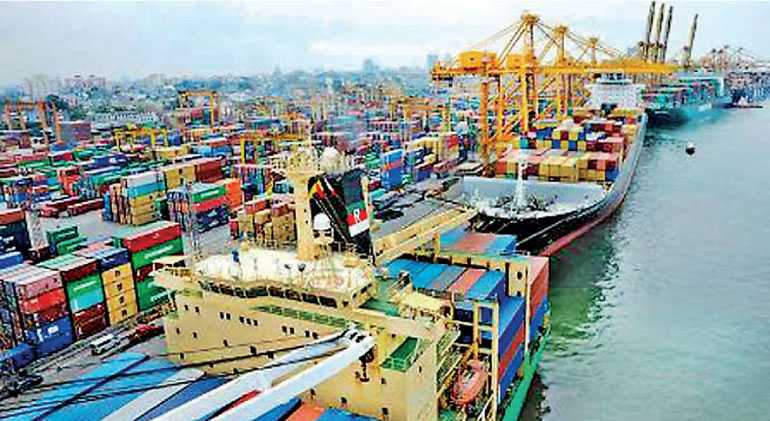Saturday Feb 21, 2026
Saturday Feb 21, 2026
Wednesday, 5 August 2020 03:01 - - {{hitsCtrl.values.hits}}

By Charumini de Silva
The two-day industrial action by the employees of Colombo Port has sunk Rs. 10 billion of revenue, apart from tarnishing the Port’s hub status, credibility, and reliability, a top official warned yesterday.
The trade unions of the Colombo Port stopped work in protest against the privatisation of its East Container Terminal (ECT), demanding a written pledge from President Gotabaya Rajapaksa that it would not be privatised by handing it over to India. The move comes after the workers in June threatened to go on an indefinite strike to protest against what they called ‘Indian pressure’ to prevent Sri Lanka from developing a deep-sea container terminal of the country’s largest and busiest port.
The strike was called off after trade unions had discussions with Prime Minister Mahinda Rajapaksa on Saturday evening.
“The two-day closure of the Colombo Port caused a huge financial, social, and political cost for the SLPA and country at large. It was uncalled for, after having adequately explained that it is an international issue which cannot be resolved overnight,” Sri Lanka Ports Authority (SLPA) Chairman Major General (Rtd.) Daya Ratnayake told the Daily FT.
Port of Colombo generates an average daily income of around Rs. 5 billion and in that context the two-day protest by the trade unions have caused a loss of Rs. 10 billion to the proceeds of the SLPA. Around 22,000 TEUs are handled in a day.
However, when asked for a specific revenue loss figure, the Chairman noted that they were yet to calculate the financial loss due to the two-day closure of port activities.
Ratnayake said the closure of the Port for two days ahead of a Parliamentary Election and amidst the global COVID-19 impact also seriously tarnished the image of Colombo Port, which is considered as the hub in South Asia. “We have had no records of breakdown of work in the past so many years. Port of Colombo was right on top among other regional ports for its efficient throughput, even during these tough times owing to COVID-19. The image was seriously damaged,” he charged.
“The matter on ECT is an international issue, and it is a twist created by the previous Government. The matter is beyond the control of the SLPA, and negotiations are ongoing between India and Japan. Such discussions take time, but will surely be resolved by the end of the year,” Ratnayake stressed.
“The Port of Colombo has reached its capacity, and the answer to address this is getting ECT operational. People outside know that we are in a dilemma, and they will do anything to take advantage of the situation. The Government is committed to provide a stable solution before the end of this year,” he added.
The previous Unity Government had signed a Memorandum of Cooperation (MOC) with India and Japan for a tripartite effort to develop the ECT, which is located just next to the $ 500 million Chinese-run Colombo International Container Terminal (CICT). Although the MOC was completed last year, a formal agreement for the terminal development is yet to be signed, and the trade unions have been pressing the Government to abandon the MOC and develop the terminal as a 100% Sri Lankan venture.
Industry experts however have warned that the Government should not take up additional burden in running yet another terminal but pursue a Public Private Partnership model.
Highlighting the competitiveness of the port operations, Ratnayake said that there were many external parties trying to capitalise on the situation by approaching the top business of Colombo Port.
“The business is very competitive, the slightest mistake could reflect a huge negative impact on the overall business, the image of the port as well as the country. There were many wanting to grab business from us during the chaotic two days by approaching our top business people, shipping lines. However, thanks to the strong relationship we have with our business partners and for their understanding on the comparative advantage of the port, we have still got them,” the SLPA Chief said.
Ratnayake assured that the operations of Colombo Port had now returned to normal, and workers were fully committed to ensure reliability.